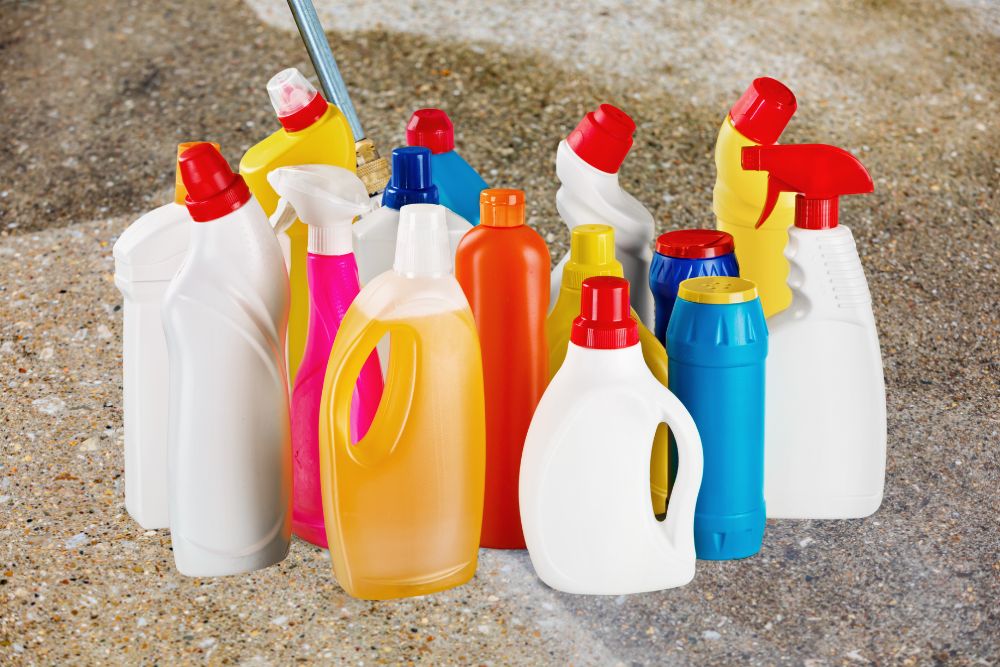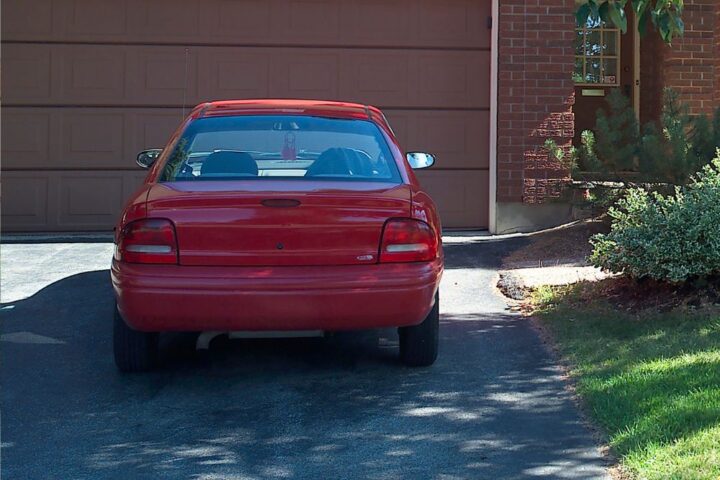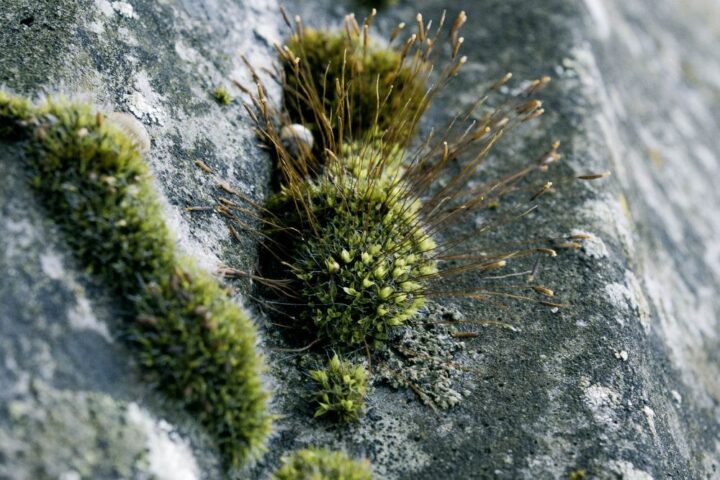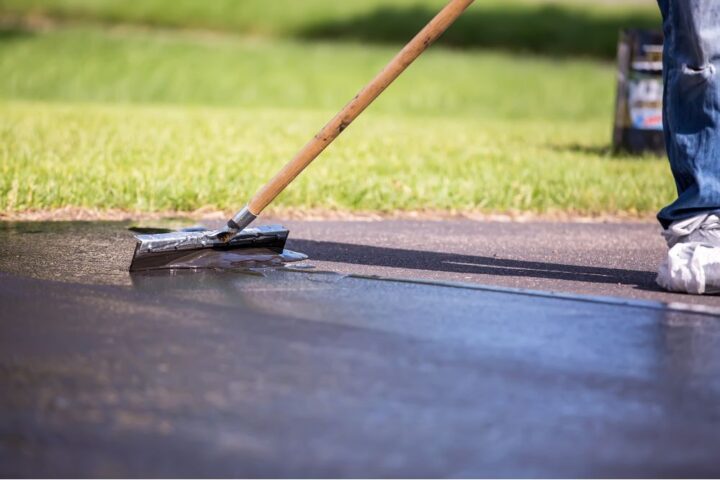The top chemicals for cleaning your concrete driveway vary based on the type of stain. For oil stains, a concrete degreaser is ideal, whilst rust stains require an acid-based cleaner, such as phosphoric acid. Natural cleaners like citric and acetic (vinegar) are effective for general use. For stubborn marks, use specialised cleaners.
In this post, we will go into the details of the best chemical cleaners for each type of application.
Effective Chemicals for Concrete Cleaning
There’s a range of chemicals that can be effective for cleaning your concrete driveway. However, before you begin, it’s critical to understand the safety precautions and correct application methods.
Choosing the Right Chemicals
To effectively clean your concrete driveway, it’s vital to select the appropriate chemicals for the stain you are working with.
For rust marks, citric acid is an excellent option, while alkaline-based cleaners perform exceptionally well on porous surfaces with stubborn stains.
Non-corrosive acid cleaners are effective for salt, rust, and efflorescence marks.
If you’re tackling oil, grease, or dirt marks, a use a concrete degreaser.
However, it’s essential to remember never to mix bleach with other cleaners – it’s a hazardous mix.
Concrete Cleaning Safety Measures
When using cleaning chemicals, always wear protective gear, such as gloves and safety goggles, before you commence your cleaning task. These will safeguard your skin and eyes from any unintentional splashes.
Make sure your work area is well ventilated to avoid breathing in potentially harmful vapours. Precise measurement of your cleaning substances is vital, and always follow the manufacturer’s guidelines for the best and safest results.
In the event of accidental contact with your skin or eyes, act swiftly by washing the affected area copiously with water. Safety should always be your primary concern when dealing with concrete cleaning substances.
Chemical Application Techniques
Applying the appropriate chemical in the right way can make the cleaning job significantly easier.
Here are four techniques to maximise the effectiveness of your cleaning chemicals:
- Phosphoric Acid: Apply directly, let it remain for a while, then wash thoroughly.
- Citric Acid: Simply sprinkle, scrub, and rinse.
- Alkaline Cleaners: Apply, let it soak in, then scrub and rinse.
- Bleach Solution: Apply this mixture, let it sit, then scrub and rinse.
Vinegar-Based Cleaning Solutions
If you’re seeking a natural and eco-friendly method to clean your concrete driveway, consider utilising a vinegar-based solution. This ordinary household item not only keeps your driveway tidy but also aids in preserving its appearance over time.
Vinegar is efficient at eliminating light stains such as dirt, grime, and mildew. To use, simply dilute white vinegar with water and apply it to the stains. This blend offers a cost-effective cleaning option.
One of the primary advantages of a vinegar-based solution is its safety. Unlike more severe chemicals, vinegar is safe to use around plants and pets. You can clean your driveway without the stress of damaging your garden or putting your pets at risk.
Routine use of a vinegar-based solution can keep your driveway in excellent condition. A periodic scrub with this natural cleaner can help your concrete driveway maintain its visual charm.
So, the next time your driveway needs a clean, reach for the vinegar.
Safely Using Hydrochloric Acid
When it comes to cleaning concrete driveways, hydrochloric acid is a strong choice, but it requires careful handling.
You’ll need to be aware of the necessary precautions, the correct application procedure, and how to neutralise and dispose of the acid safely.
Hydrochloric Acid: Precautions
Whilst it’s effective at removing stubborn stains from concrete driveways, hydrochloric acid must be handled with utmost care due to its corrosive properties and potential danger to your skin and eyes. Here’s a set of precautions to bear in mind:
- Wear Protective Gear: Always put on gloves, goggles, and a mask. This will safeguard your skin, eyes, and prevent you from breathing in harmful fumes.
- Dilute Correctly: Adhere strictly to the manufacturer’s instructions. Avoid combining hydrochloric acid with other chemicals.
- Ensure Good Ventilation: Make certain that you’re operating in a well-aired area to lessen the risk of breathing in fumes.
- Store Securely: Keep the acid in a safe spot, out of reach of children and pets.
Correct Application Process
Dilute the acid with water following the manufacturer’s guidelines to ensure safety and effectiveness.
Use a brush or sprayer to apply the diluted solution, focusing on stained areas. Allow it to sit for the advised time to penetrate and dissolve the stains.
Afterwards, it’s essential to thoroughly rinse the treated areas with clean water. This step ensures no acid residue remains, which could continue to impact the concrete.
Neutralisation and Disposal
Once you’ve finished cleaning your concrete driveway with hydrochloric acid, it’s crucial to neutralise the acid to avoid possible harm to the environment or other surfaces.
Here’s how to do this:
- Utilise a base such as bicarbonate of soda or ammonia to effectively neutralise the acid.
- Mix the solution until the pH levels even out, making it safe for disposal.
- Dilute the neutralised acid with an ample amount of water before getting rid of it.
- Pour the diluted solution down a drain or flush it with a large quantity of water.
Conclusion
These are the most common chemicals for cleaning concrete. If you have stains on your driveway, one of these is bound to get the job done.




